I am not sure about you, but I definitely miss Italian food the most after starting this AIP journey. Thank goodness this no-tomato sauce exists to replace all the tomato sauce cravings. I used to think I was intolerant to garlic, because I always got sick after eating at Italian restaurants, like Olive Garden. Garlic was always the strongest flavor in the food, so I thought it was the culprit. In fact, I tested my theory after my first colonoscopy. I thought that since I was completely cleaned out and hadn’t eaten in 36 hours, I would be able to pinpoint my intolerance. So after my scope, my mom and I went out to lunch at Olive Garden. Within 30 minutes of eating, I was sick. And that was the last time I ate at Olive Garden. Italian restaurants are really a Crohnie’s worst nightmare. RIP delicious bread sticks. Little did I know how healthy garlic was and how inflammatory gluten and dairy were.
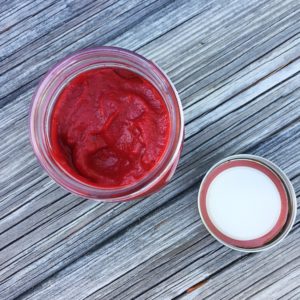
No Mo Reflux
I did not give up nightshades until I started my AIP journey. Avoiding gluten and dairy took care of the majority of my acid reflux. However, foods like tomatoes, chocolate, and oatmeal really aggravated my symptoms, in addition to the other intestinal symptoms. Thankfully, I can now handle tomatoes and chocolate every so often after healing on AIP. I do not like to eat tomatoes frequently, because they are pretty acidic, and I do not want to cause inflammation. So for the days I am craving “pasta” with spaghetti sauce, this no-tomato sauce is the answer.
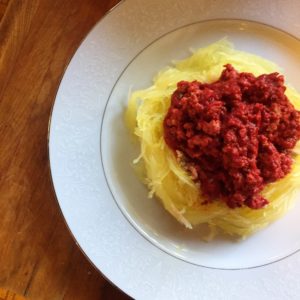
No-tomato sauce & ground turkey over spaghetti squash
Not Your Grandma’s Tomato Sauce
Now, I bet your grandma’s tomato sauce was delicious, but if you have Crohn’s, colitis, IBS, or any digestive condition, tomatoes probably cause symptoms. But not to fear, we can make “tomato” sauce with the tomatoes. Beets not only give no-tomato sauce a beautiful color, but also are full of vitamins.
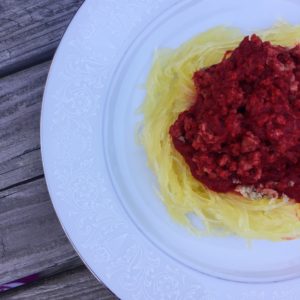
What’s so great about beets?
1. May Reduce Blood Pressure: Beets are full of inorganic nitrates, and these inorganic nitrates lead to increased nitrite levels in the body. Nitrite is a potent vasodilator. Vasodilators relax the smooth muscle in blood vessels, effectively lowering blood pressure. A 2013 meta-analysis showed that inorganic nitrates and beetroot juice supplementation both significantly decreased systolic blood pressure [1].
2. May Decrease Inflammation: Beets contain betaine, and studies have shown that individuals who supplemented with betaine have significantly lower inflammatory markers (CRP) and TNF-a levels than individuals who did not. TNF-a is the cytokine (pro-inflammatory cell signaling molecule) that biologics like Humira, Remicade, and Cimzia block to treat autoimmune diseases. Spinach and shellfish also contain significant amounts of betaine [2].
3. May Have Anti-Cancer/Anti-Inflammatory Properties: Angiogenesis (the development of new blood vessels) and inflammation are important processes for tumor growth. One study showed that betaine reduced inflammation and decreased tumor formation in mice with colitis-associated colon cancer [3]. Another study found that betaine reduced angiogenesis and decreased pro-inflammatory pathways in mice [4].
Additionally, obesity is associated with chronic low-level inflammation and elevated inflammatory markers. A study showed that betaine lowered these inflammatory markers and reversed inflammation in human adipocytes (fat cells) that were damaged by low oxygen levels [5]. All of these studies used physiologically relevant concentrations of betaine that are attainable from food, not just supplementation.
4. High Fiber & Nutrient Content: Beets are full of healthy fiber, vitamin C, potassium, manganese, folate, and more [5].
Don’t fear the beets, give this sauce a try!
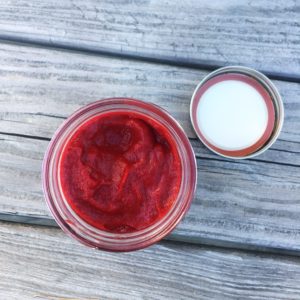
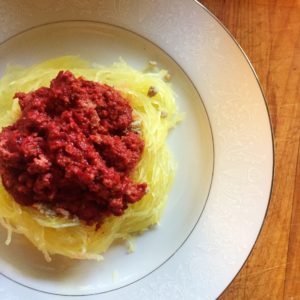
[1] Siervo, Mario, et al. “Inorganic nitrate and beetroot juice supplementation reduces blood pressure in adults: a systematic review and meta-analysis.” The Journal of nutrition 143.6 (2013): 818-826.
[2] Detopoulou, Paraskevi, et al. “Dietary choline and betaine intakes in relation to concentrations of inflammatory markers in healthy adults: the ATTICA study.” The American journal of clinical nutrition 87.2 (2008): 424-430.
[3] Kim, Dong Hwan, et al. “Anti-inflammatory effects of betaine on AOM/DSS‑induced colon tumorigenesis in ICR male mice.” International journal of oncology 45.3 (2014): 1250-1256.
[4] Yi, Eui-Yeun, and Yung-Jin Kim. “Betaine inhibits in vitro and in vivo angiogenesis through suppression of the NF-κB and Akt signaling pathways.” International journal of oncology 41.5 (2012): 1879-1885.
[5] “Beets.” NutritionFacts.org. N.p., n.d. Web. 15 June 2017.
 Copyright secured by Digiprove © 2018 Jamie Horrigan
Copyright secured by Digiprove © 2018 Jamie Horrigan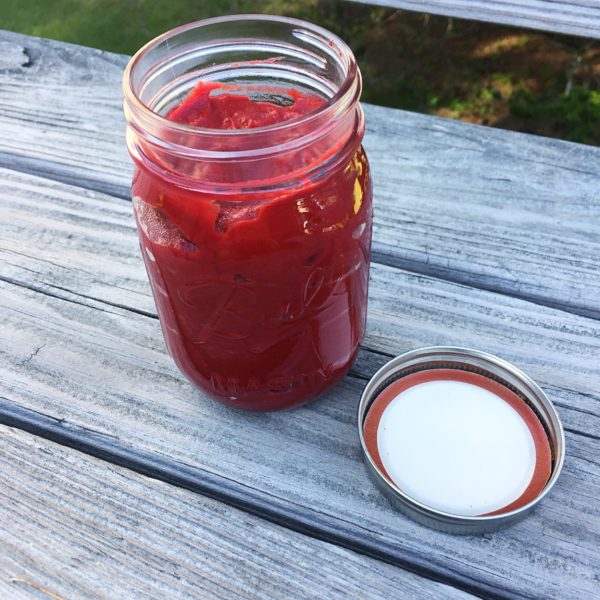
| Prep Time | 30 minutes |
| Cook Time | 1 hour |
| Servings |
people
|
- 1 medium beet
- 2 tbsp olive oil *any cooking oil/fat works
- 1 large onion
- 5 cloves garlic, minced
- 3 large carrots, chopped
- 1 tsp garlic powder *omit for SCD
- 1 tsp basil
- 1 tsp parsley
- 1/4 tsp oregano
- 1 tsp lemon juice
- 1.5 cups bone broth *any vegetable/chicken/beef broth works
- 1/2 tsp salt
- 2-3 pieces bacon or Italian sausage *optional
Ingredients
|

|
- Boil one unpeeled beet for 45 minutes. Some say adding lemon juice to the water helps prevent the beet juice from leaking.
- While the beet is cooking, heat the oil in a large pot
- Add the onion and garlic to the pot, and cook for 10 minutes on medium heat
- Add the broth, carrots, and lemon juice to the pot. Also add the bacon or Italian sausage if you are using them.
- Mix the spices into the pot
- Simmer the ingredients covered for 30 minutes
- When the beet is fork tender, rinse it with cool water
- Once the beet has cooled a little, remove the skin with your fingers. It should come right off.
- Chop the beet, and add it to the pot
- Simmer an additional 15-20 minutes, or until the carrots are fork tender
- Use an immersion blender, Nutribullet, or a food processor to puree the sauce
- Adjust the seasonings to your liking and enjoy on your favorite pasta or pasta alternative
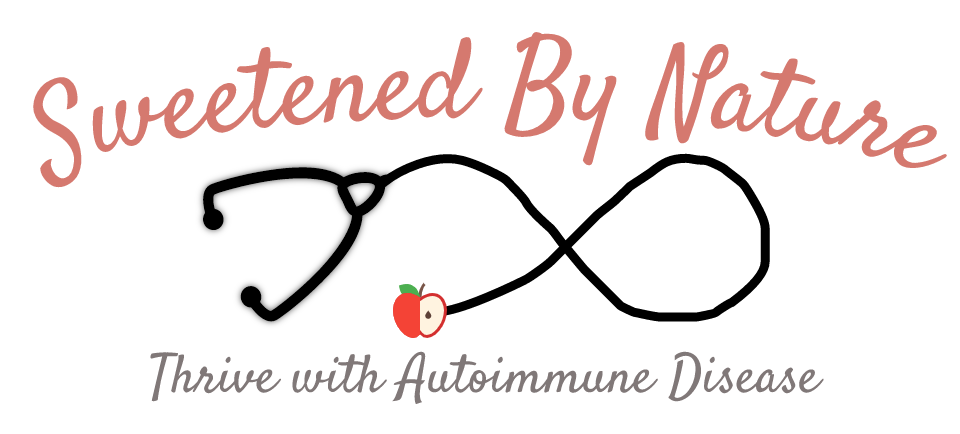
I have literally made this 10x over this food journey, it’s so good and so easy. Thank you.
That’s so awesome, I’m glad you like it!